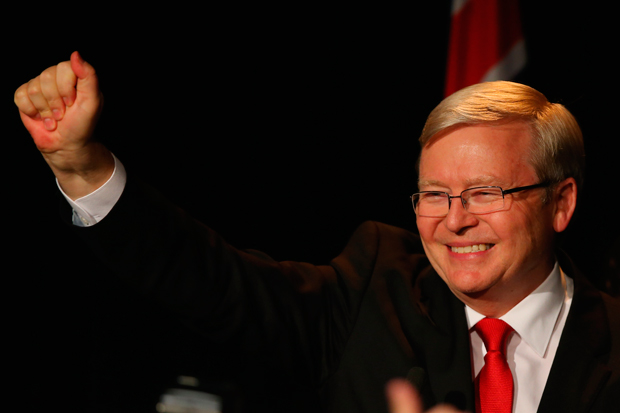There is a curious twist in the montage on the cover of Rodney Tiffen’s Disposable Leaders; a detailed treatise on unstable political leadership, resulting coups and consequent leadership changes. The cover is dominated by a fly-blown garbage bin, into which the heads of Australian political leaders, from Hawke to Abbott, representing both sides of the aisle, have been discarded. What is curious in this illustration of rejection, however, is the head of Malcolm Turnbull. When I last looked, Malcolm was still PM, although under sustained internal Party criticism and electoral pressure.
A scene in Oliver Stone’s raw film on Vietnam, Platoon (1986) best defines the present state of the Liberal Party in Canberra. As the film reaches its climax, the besieged American commander leaves his sand-bagged command bunker, with his radio man, and proceeds to call down an air strike on his own position, accompanied by the memorable declaration: ‘We’ve got “zips” inside the wire’.
As he does so, a soldier of the North Vietnamese Army, embracing an explosive charge, rushes into the command bunker and blows it to kingdom come.
The anti-Turnbull forces are now auditioning for that role of the NVA suicide bomber, prepared to detonate a device in the Party room; opening another leadership contest; to destroy the Turnbull leadership and then elect a new PM, although probably not Tony Abbott.
The problem with this outcome, as Laurie Oakes pointed out last year, is that Malcolm Turnbull, having been so discarded, may choose to retire from politics and leave his marginal seat of Wentworth vacant. A by-election loss in Sydney’s eastern suburbs, of course, would see the Coalition government fall. This does not appear to trouble conservative plotters and this is a point worth noting about leadership challenges. Rarely does the national interest appear to figure as being decisive.
So how did Australian politics arrive at this point of the disloyalties and corrosive ambitions of the Fourth French Republic? Rodney Tiffen, Emeritus Professor in Government and International Relations at Sydney University, with an impressive list of contributions on subjects as different as Rupert Murdoch, East Timor and Australian scandals and corruption, has a commendable run at offering answers, focussing on our presidential style of leadership and the dramas common to most other parliamentary democracies.
We live in a microwave age, in which instant electoral gratification, encouraged by politicians, is often demanded by the electorate. This means a constant demand in parliamentary parties for sugar hits. Unpopular decisions are concealed or avoided. The timeline is usually measured in days. Leaders are sometimes reduced to the status of Willy Wonka distributing sweets.
Tiffen’s book is a comprehensive study of leadership challenges: the personal enmities; the duplicities; the close confines of the party room constituency; the crisis which triggers a spill.
It is also a study in political cowardice, where the governing parties display Pavlovian tendencies in response to poor polling. There is a deficit of leadership, a lack of resolve and the substitution of political chicanery to replace policy rigour.
With insight, Tiffen writes:
The cry for new leadership is often an intellectual abdication. The analysis of deeper or more challenging problems is abandoned by putting all the blame for current problems on the leaders, and seeing a new leader as the ‘solution’. Sometimes this masks a somewhat authoritarian yearning for certainty and order, reflecting the old saying that what this country needs is a benevolent dictator.
This begs the question: should we be talking about disposable leaders or disposable politics?
The latter, I am reluctant to conclude, is much closer to the mark. The music hall tragedy of ‘Rudd/Gillard/Rudd’ has simply been replaced by the vaudeville farce of ‘Abbott/Turnbull/Abbott’.
Tiffen marries the media effectively to the incendiary politics of leadership contests and his sweeping examination of some seventy three leadership coups in our political life since 1970 permits the author to draw certain realistic conclusions on political deceit, treachery and ineptitude. But no conclusion is as savage as that drawn by the redoubtable Senator Robert Ray on the behaviour of the media during the 1991 Hawke/Keating challenge: ‘What sort of adjectives could describe the role of the media from June to December 1991? Craven? Blood lusting? Incompetent? Biased? Bigoted? None of them adequately describes the way Hawke was treated by the Gallery, nearly all the Gallery.’
The missing piece in Tiffen’s analysis is the primary impact of polling. True, it is mentioned in passing, with reference to ‘The Lindsay Test’ being insisted upon by the NSW ALP machine during the Gillard leadership, as the litmus test for electoral acceptability. But it deserves far greater emphasis.
Constant public polling has reduced our politics to a modern version of The Gong Show, where a slight stumble can prove disastrous. As our major parties’ support erodes, the unscrupulous at the margins play havoc with a jaded and jaundiced electorate. Polls contribute to the regular waves of instability generated by relentless emphasis on trivia: witness Malcolm Turnbull’s ‘gaffe’ over a sausage sandwich in the aftermath of a cyclone in North Queensland.
The author occasionally speculates on what might have been had there been no leadership coup. No, John Gorton would not have won in 1972. The government was burned out after 23 years in office.
The electorate merely drew the same conclusion on Billy McMahon as did Sir Paul Hasluck: ‘Disloyal, devious, dishonest, untrustworthy, petty, cowardly… a contemptible creature.’
Tiffen succeeds in demonstrating the disposability of leaders and does so with a knowledgeable eye. There are occasional errors, such as confusing James Scullin with Joseph Lyons.
But by and large, this book provides a convincing perspective on our temporary political leaders, presiding over a dysfunctional system that sees enduring answers in the expedient remedy of a parliamentary revolving door.
Got something to add? Join the discussion and comment below.
Get 10 issues for just $10
Subscribe to The Spectator Australia today for the next 10 magazine issues, plus full online access, for just $10.
You might disagree with half of it, but you’ll enjoy reading all of it. Try your first month for free, then just $2 a week for the remainder of your first year.













Comments
Don't miss out
Join the conversation with other Spectator Australia readers. Subscribe to leave a comment.
SUBSCRIBEAlready a subscriber? Log in